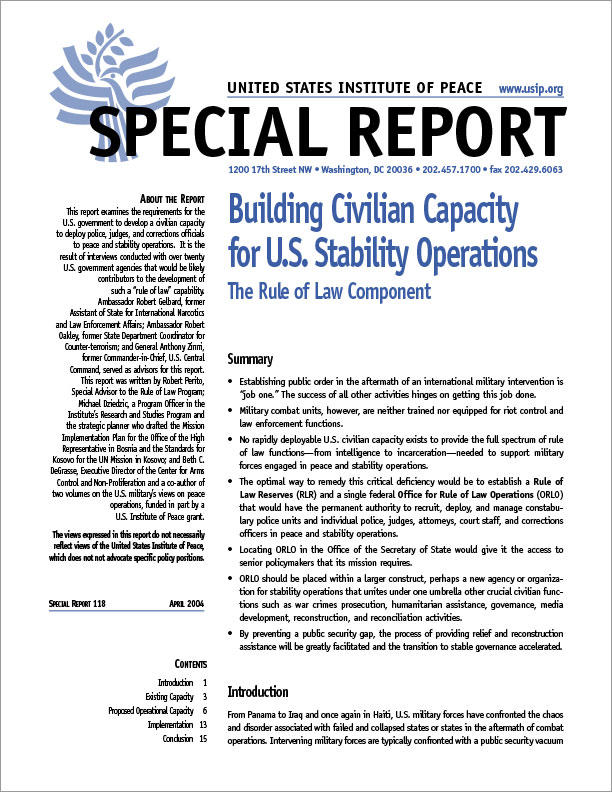Establishing public order in the aftermath of an international military intervention is "job one." The success of all other activities hinges on getting this job done. Military combat units, however, are neither trained nor equipped for riot control and law enforcement functions. No rapidly deployable U.S. civilian capacity exists to provide the full spectrum of rule of law functions—from intelligence to incarceration—needed to support military forces engaged in peace and stability operations.

Summary
- Establishing public order in the aftermath of an international military intervention is "job one." The success of all other activities hinges on getting this job done.
- Military combat units, however, are neither trained nor equipped for riot control and law enforcement functions.
- No rapidly deployable U.S. civilian capacity exists to provide the full spectrum of rule of law functions—from intelligence to incarceration—needed to support military forces engaged in peace and stability operations.
- The optimal way to remedy this critical deficiency would be to establish a Rule of Law Reserves (RLR) and a single federal Office for Rule of Law Operations (ORLO) that would have the permanent authority to recruit, deploy, and manage constabulary police units and individual police, judges, attorneys, court staff, and corrections officers in peace and stability operations.
- Locating ORLO in the Office of the Secretary of State would give it the access to senior policymakers that its mission requires.
- ORLO should be placed within a larger construct, perhaps a new agency or organization for stability operations that unites under one umbrella other crucial civilian functions such as war crimes prosecution, humanitarian assistance, governance, media development, reconstruction, and reconciliation activities.
- By preventing a public security gap, the process of providing relief and reconstruction assistance will be greatly facilitated and the transition to stable governance accelerated.
About the Report
This report examines the requirements for the U.S. government to develop a civilian capacity to deploy police, judges, and corrections officials to peace and stability operations. It is the result of interviews conducted with over twenty U.S. government agencies that would be likely contributors to the development of such a "rule of law" capability.
Ambassador Robert Gelbard, former Assistant of State for International Narcotics and Law Enforcement Affairs; Ambassador Robert Oakley, former State Department Coordinator for Counter-terrorism; and General Anthony Zinni, former Commander-in-Chief, U.S. Central Command, served as advisors for this report.
This report was written by Robert Perito, Special Advisor to the Rule of Law Program; Michael Dziedzic, a Program Officer in the Institute's Research and Studies Program and the strategic planner who drafted the Mission Implementation Plan for the Office of the High Representative in Bosnia and the Standards for Kosovo for the UN Mission in Kosovo; and Beth C. DeGrasse, Executive Director of the Center for Arms Control and Non-Proliferation and a co-author of two volumes on the U.S. military's views on peace operations, funded in part by a U.S. Institute of Peace grant.